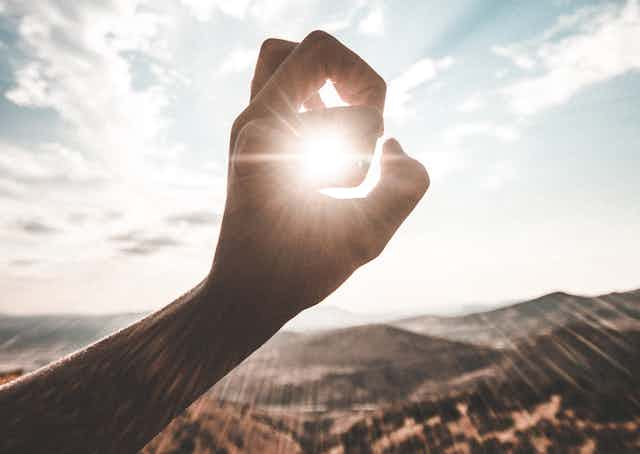Curious Kids is a series for children. If you have a question you’d like an expert to answer, send it to curiouskids@theconversation.edu.au You might also like the podcast Imagine This, a co-production between ABC KIDS listen and The Conversation, based on Curious Kids.
Will I go blind if I shut my eyes and face the Sun? - Samuel, age 9, Canberra.
Hi Samuel, thank you for your excellent question.
The short answer is if you squeeze your eyes shut very tight and then face the Sun, that should be enough to protect your eyes from damage. You won’t go blind.
But be careful because it is very easy to damage your eyes with sunlight. You should never look directly at the Sun, with or without sunglasses, even during a solar eclipse, because that can cause a lot of damage to the eyes. Sometimes this damage can be permanent.
In August 2017 a very silly man named Donald Trump shocked many people when he looked directly at the Sun without protecting his eyes. Everybody was gathered to see a solar eclipse, which is when the Moon gets in the way of the Sun and blocks out a lot of its light. This doesn’t happen very often and lots of people will gather around to watch one, but people usually wear special glasses (not normal sunglasses) to do it.
Sunlight and your eyes
Light from the Sun is very powerful and looking straight at it by accident will usually make you blink and close your eyes involuntarily. That means it happens by itself, without you having to think about it to make it happen.
It’s like how you start blinking when a bit of dust or sand enters your eyes. It’s our body’s way of protecting our eyes from damage. If you squeeze your eyes shut and then look at the Sun, your eyes should be OK.
But what would happen if you forced yourself to keep your eyes open and stared straight at the Sun? (Please don’t do this.)
If you do it for long enough, you might end up with a condition called “solar retinopathy”. This condition is rare because most people are thankfully sensible enough to not stare at the Sun. But it can happen to people who watch solar eclipses without eye protection, or people who stare at the Sun (by accident or on purpose) because they are under the influence of drugs, have a mental illness, or looked at the Sun through a telescope.

In this condition, affected people will notice blurry vision (especially in the centre of their vision), a “blind spot” in one or both eyes, and distortion of their vision (things might look wavy or wobbly).
This happens because the light from the Sun essentially burns a small spot deep inside the eye on the spot on which it was focused. We unfortunately don’t have any way of treating this condition and if it happens, all we can do is wait and see if it gets better by itself. Most of the time it does, but sometimes the person might have that blind spot in their vision for a very long time, or for the rest of their life.

Flash burn
Something that happens more commonly than solar retinopathy is a condition called “photokeratitis” (most people call it “flash burn”).
This is like having sunburn but on the surface of your eye rather than on your skin. It is very, very painful and people who get it will often need very strong medicines to help with their pain.

You don’t usually get this condition from staring at the Sun, but from short bursts of huge amounts of powerful light, like the reflection of sunlight from snow (that’s why many skiers wear special goggles rather than normal sunglasses) or the light that comes from welding metal (which is why welders wear big helmets).
You can also get it if you don’t protect your eyes when using a tanning bed (but you shouldn’t use these anyway because they can cause skin cancer). Thankfully, unlike solar retinopathy, this condition usually gets better by itself in a few days and does not cause any permanent damage.

Not staring straight into the Sun is very important, but so too is protecting your eyes. If you’re outside, always wear sunglasses – they will protect your eyes from the damage the sun causes over months and years.
Hello, curious kids! Have you got a question you’d like an expert to answer? Ask an adult to send your question to curiouskids@theconversation.edu.au

Please tell us your name, age and which city you live in. We won’t be able to answer every question but we will do our best.

